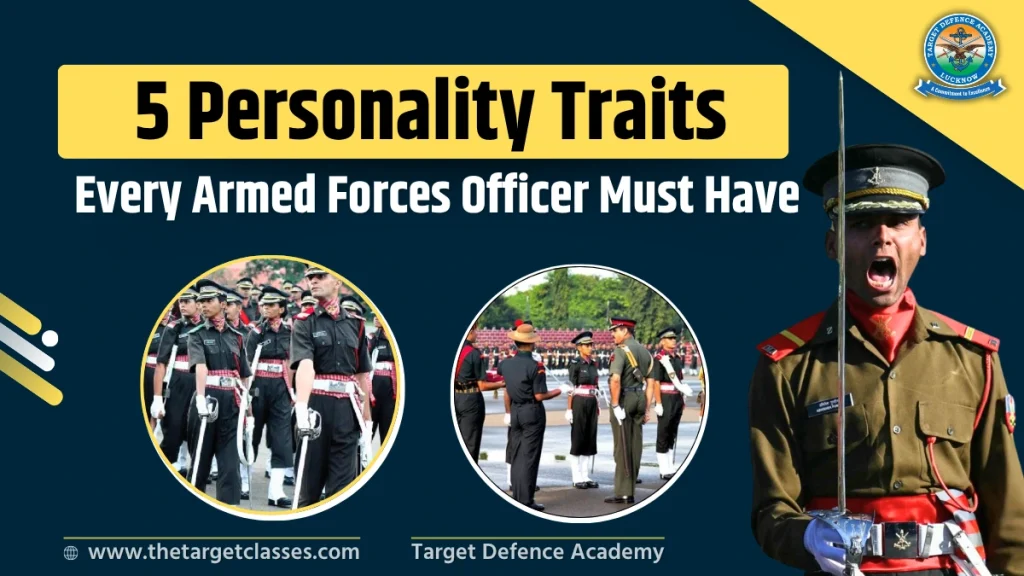In the world of armed forces – either army, the Navy, or the Air Force – physical shape is just the tip of the iceberg. As a competent officer gives a real form to a candidate, it is deep, inherent personality symptoms that define how they think, act, and lead. These are not learned overnight, but develop with self-awareness, experience, and discipline. If you dream of donating the iconic uniform, break down the five most essential personality traits.
1. Leadership: The Art of Guiding and Inspiring
Management is the cornerstone of the identity of any officer. But this is not just about the orders about barking or having responsibility – it is about inspiring faith, motivating teams, and fast, moral decisions in stressful situations.
What does leadership look like in defence?
- Taking initiative in group tasks (especially in SSB GTO and GD).
- Voluntarily stepping up during a crisis without waiting to be told.
- Inspiring confidence among peers.
How to develop it:
- Lead small teams in your school, college, or NCC.
- Practice decision-making under time pressure.
- Read biographies of great military leaders.
Leadership isn’t always approximately being the loudest voice within the room—it’s approximately being the one everybody turns to when the going gets tough.

2. Discipline: The Backbone of Military Life
Without discipline, even the strongest forces will falter. Discipline does not just mean waking quickly or shining shoes-it means self-regulation, following values, and doing the right thing even when you look at someone.
Why it matters:
- Ensures consistency in training and duty.
- Helps handle both orders and responsibilities.
- Promotes mutual admiration and order in the command structure.
Tips to increase discipline:
- Make and follow a strict daily routine.
- Start with small habits: time ban, hygiene, responsibility.
- Practice saying “no” to being distracted and being lazy.
A disciplined officer earns easy respect from peers and subordinates.
3. Flexibility: mental cruelty that undergo
In an environment with high stress, the authorities face physical threats, emotional stress, and mental fatigue. Flexibility is the characteristic that keeps you calm, gathered, and functional under such circumstances.
Examples in real-world defence roles:
- Living days of hostile deployment in extreme weather.
- To make decisions on life during war.
- Bounces back from errors during training or assignments.
Ways to build flexibility:
- Slide your boundaries in physical endurance challenges.
- Practice stress management techniques (e.g., attention or ironing).
- Learn from mistakes instead of being expensive.
Keep in mind that even though the body may momentarily fall apart, the mind must continue to be extraordinary.
4. Adaptability: Navigation of change with Confidence
Armed forces are dynamic – new areas, different units, transfer assignments. Officers are constantly kept under unknown, challenging circumstances. Your ability to adapt quickly and positively to your success is an important factor.
Where adaptability shines:
- During sudden deployments in new geographies.
- Managing cultural differences in inter-service operations.
- Navigating technological shifts in modern warfare.
Developing adaptability:
- Often pulls out of your rest area.
- Learn to work with different personality types in teams.
- Be open to the response and make changes to the routine.
Those who adapt, thrive. Those who resist, falter.
- Common Mistakes to Avoid in SSB Interview
- Group Planning Exercise (GPE) Practice in SSB GTO Task
- Tips to Crack SSB Interview in First Attempt
- List of Top 5 NDA Coaching in India | Best NDA Coaching in India
5. Integrity: The Core of Your Moral Compass
Integrity is an invisible shield that should be taken to each officer. It means being honest, moral and responsible, even when it is difficult or unpopular. Faith in a team, respect between the elderly and the morality of subordinates – it all depends on the officer’s morale.
When integrity matters:
- Reporting a mistake or breach—even if it implicates you.
- Choosing safety over shortcuts.
- Standing up for what’s right during internal conflicts.
Ways to practice integrity:
- Develop a robust moral compass through introspection and values.
- Speak the reality, even though it’s uncomfortable.
- Own up to your duties and errors.
In the battlefield of choices, integrity will always be your compass.
Conclusion
The journey to become an armed management officer is less about eligibility and more about character. These five symptoms – leadership, discipline, flexibility, adaptability, and integrity – which stand a candidate in SSB and Excel in real service.
Start cultivating these today. Every step, every small habit, every personal test of will builds the foundation of your future officer-self. Remember that medals are already earned in silence.
FAQs for Personality Traits Every Armed Forces Officer Must Have
Ans. Yes, each activity from PPDT to GTO features is designed to evaluate these personality symptoms or OLQs (officers’ like qualities).
Ans. Absolutely. With frequent efforts, real-life applications, and mentorships, these symptoms can be cultivated.
Ans. All are essential, but integrity is non-negotiable—it forms the base for every other trait.
Ans. Yes, but these are foundational. Other traits like confidence, empathy, and presence of mind are extensions of these core five.
Ans. Ideally, from your teens. But even if you start late, sincere effort will always pay off

